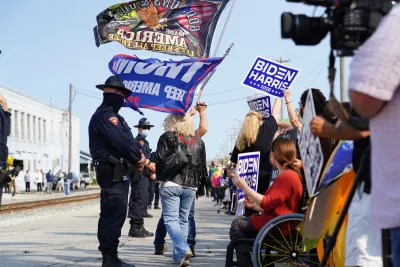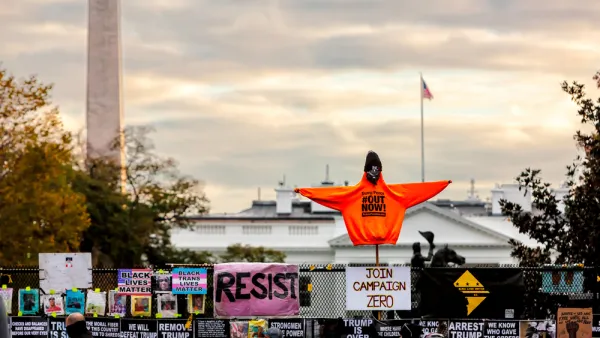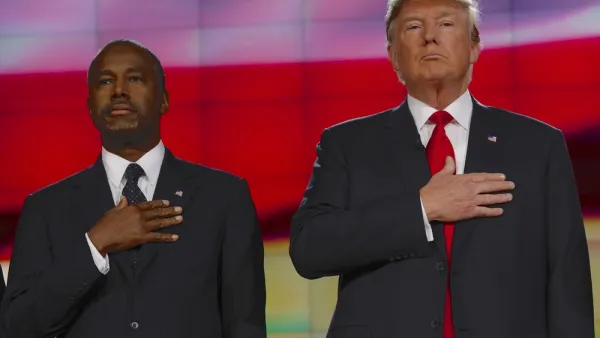Trump has been repeatedly criticized for misunderstanding the suburbs, but former Vice President Jose Biden's take on the subject during the debate also missed the mark.

Anyone who tuned into the presidential debate earlier this week in the hopes that a promised segment on race and violence in cities would reveal a substantive and revealing discussion was probably disappointed.
Kriston Capps and Laura Bliss provide commentary and analysis of one of the few coherent moments from the debates—when the conversation briefly turned to the subject of the suburbs.
Here's the debate exchange, as transcribed in the article:
“Our suburbs would be gone” under a Biden presidency, [Trump] said. “You would see problems like you’ve never seen before.”
Biden replied: “He wouldn’t know a suburb unless he took a wrong turn. I was raised in the suburbs. This is not 1950. All these dog whistles and racism don’t work anymore. Suburbs are by and large integrated.”
The point made by Trump is familiar, having been a key talking point for several months now, and Biden's response is probably an echo of the many criticisms of Trump's understanding of the suburbs. So, Bliss and Capps instead take issue with Biden's use of the word "integrated," which they characterize as "not quite right."
Here's how the writers summarize the criticism:
“The suburbs” is a sweeping American category that includes the the majority of the U.S. population. As of 2010, they also contain the majority of every demographic group. In that sense the suburbs are indeed diverse. But as Brookings Nonresident Senior Fellow Elizabeth Kneebone has written, “they don’t live in the same suburbs.” Within the vast swath of American land that is vaguely defined as the suburbs, racial and ethnic groups remain separated.
The problem is segregation, according to Capps and Bliss, which is why the federal Fair Housing Act is necessary, and why the Trump administration has worked throughout the last four years to weaken enforcement of fair housing rules.
"So are suburbs 'by and large integrated'?" ask Capps and Bliss to interrogate the statement by Biden during the debate.
Compared to cities, perhaps, where the concentration of poverty is severe and soaring housing prices have locked out the middle class. But even as the suburbs grow more diverse, they stand to grow more segregated. The Trump administration has done away with the federal government’s best tools for assessing and comparing segregation patterns, which means that growing suburbs may use federal dollars for housing, highways and education in a way that makes segregation worse.
FULL STORY: Diverse? Yes. But Are U.S. Suburbs Actually Integrated?

Analysis: Cybertruck Fatality Rate Far Exceeds That of Ford Pinto
The Tesla Cybertruck was recalled seven times last year.

National Parks Layoffs Will Cause Communities to Lose Billions
Thousands of essential park workers were laid off this week, just before the busy spring break season.

Retro-silient?: America’s First “Eco-burb,” The Woodlands Turns 50
A master-planned community north of Houston offers lessons on green infrastructure and resilient design, but falls short of its founder’s lofty affordability and walkability goals.

Test News Post 1
This is a summary

Analysis: Cybertruck Fatality Rate Far Exceeds That of Ford Pinto
The Tesla Cybertruck was recalled seven times last year.

Test News Headline 46
Test for the image on the front page.
Urban Design for Planners 1: Software Tools
This six-course series explores essential urban design concepts using open source software and equips planners with the tools they need to participate fully in the urban design process.
Planning for Universal Design
Learn the tools for implementing Universal Design in planning regulations.
EMC Planning Group, Inc.
Planetizen
Planetizen
Mpact (formerly Rail~Volution)
Great Falls Development Authority, Inc.
HUDs Office of Policy Development and Research
NYU Wagner Graduate School of Public Service



























